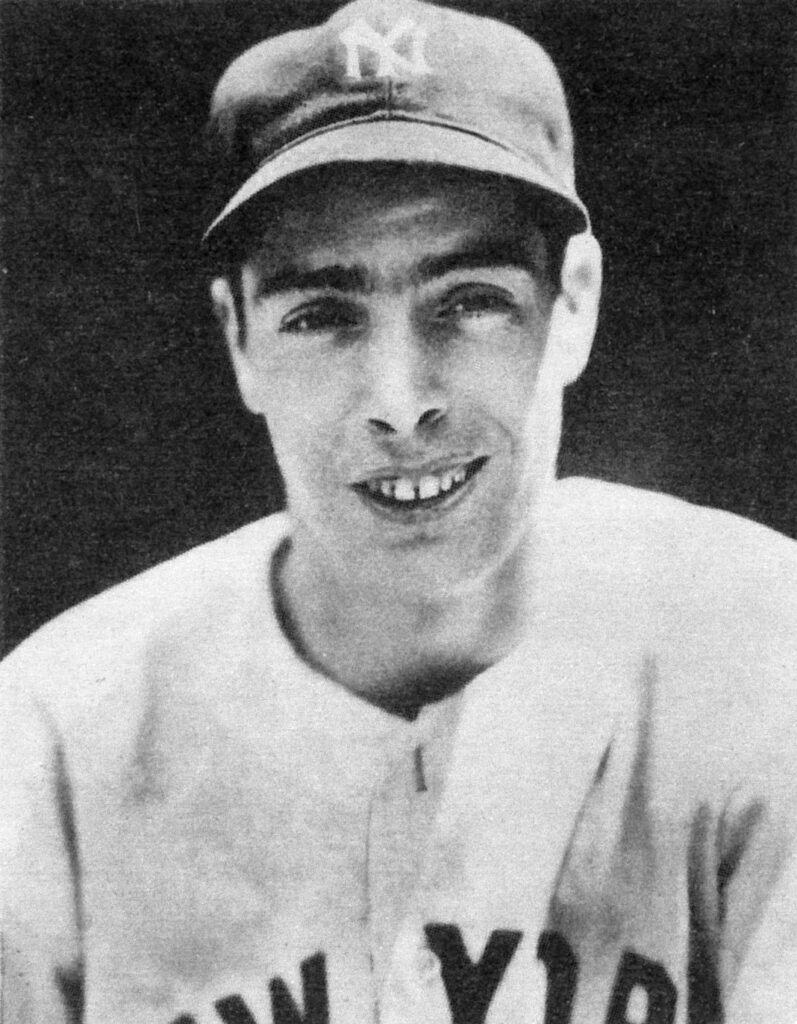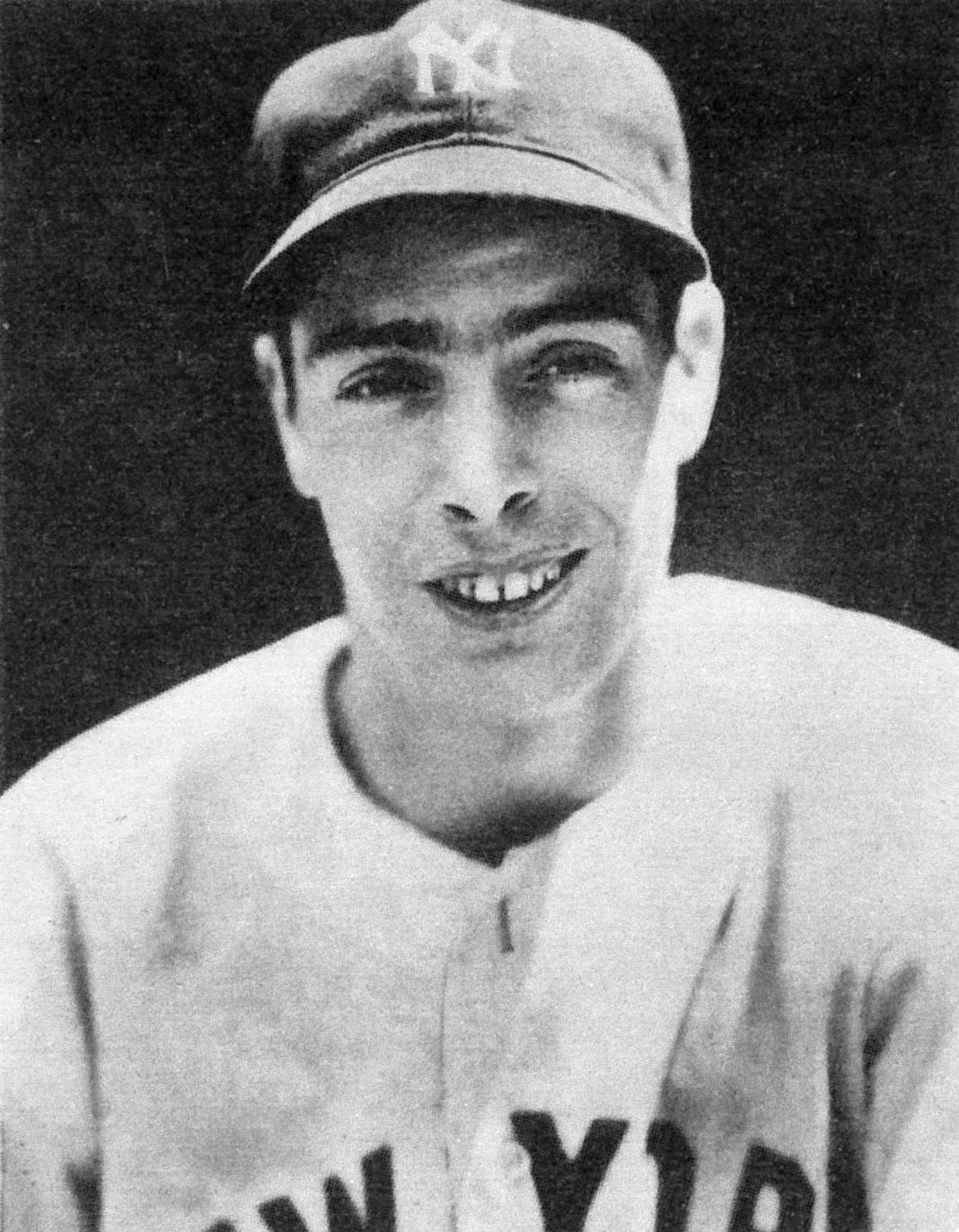
Every so often, someone asks the question “Who is the most famous person you’ve ever met?” You see it on Facebook every now and then, and sometimes it becomes a topic of conversation at a party or other such gathering.
It takes me no time at all to give my answer: Joe DiMaggio.
If you’ve read the “About Marshall” page, you already know that I spent a number of years working in minor league baseball, for a variety of teams across the country, or at least, from New York to Texas. In all those stops, I got to meet a lot of the greats of the game, including Hall of Famers like Mickey Mantle, Brooks Robinson, Warren Spahn, Yogi Berra, Sparky Anderson, Stan Musial, Pee Wee Reese… yeah, OK, so I’m indulging in a little name-dropping here. The truth is, though, when I would meet these people, I had to work hard, very hard, to act my age and not suddenly revert back to jumping around like I was nine years old.
My first year in minor league ball was 1978, when I worked as the Assistant General Manager of the St. Petersburg Cardinals of the Florida State League. If the name is not familiar, that’s because they no longer exist, forced into extinction by the arrival of the (then) Tampa Bay Devil Rays. (Here’s an unnecessary tangent: I also worked for the Amarillo Gold Sox, the Waterloo Indians, and the Utica Blue Sox, none of whom are around any longer. I’m sure it’s just an unfortunate coincidence.)
My General Manager in St. Pete was a fellow named Ralph Miller, who had his own unique operating style. As I learned over the years, successful minor league GMs work their tails off all year long but especially during the playing season, when a work day during a homestand generally lasts around 14 hours or so. That wasn’t Ralph’s MO — he’d come into the office around 10 am and leave around 2 pm. If we had a home game that evening, one of us (I worked with another young man hoping to make baseball his career) would stick around to answer the phone, while the other went home, before we all re-assembled at the ballpark for the game. If the Cards were on the road, our workday was over when Ralph said “See you tomorrow.”
And this drove me nuts. Even now, when I am living in retirement, I can’t just sit around. I like to stay busy, NEED to stay busy, and here I was, sitting in my little garage apartment (it really had begun its life as a garage), wondering how to fill up the rest of the day. It didn’t take me long, then, to walk across the street to the National Association office.
If you’re keeping score, the fully name was the National Association of Professional Baseball Leagues, or NAPBL. In reality, they ran the minor leagues for almost twelve decades until Rob Manfred and his army plowed through the baseball landscape a couple of years ago. (Don’t worry, we will be talking about that soon!) They were just about 30 yards away from the ballpark, so one afternoon I walked in and talked to John Dittrich. He was the Assistant to the President, a former and future minor league GM, and someone I had met a couple of years earlier. We had become friends – in fact, he was the one who tipped me off that his neighbor had this garage apartment available – so I asked if he ever needed any help. “Well, we can’t afford to pay you,” he said, and I responded that I’d be happy to volunteer since I was just looking for something to do most afternoons. And besides, Ralph was paying me the munificent sum of $50 a week, who needed more money? John, of course, was happy to have a free pair of hands, so I began working with him and their small staff, which also included the President of the NAPBL, Bobby Bragan.
Now, that’s a name you may recognize. Bobby played in the majors for the Phillies and Dodgers, then became a manager in both the minors and majors (Pirates, Indians and Braves). Later he served as the President of the Texas League, and then springboarded to running all of the minors. Bobby was a great guy who became a wonderful friend, someone I have missed every day since his death in 2010.
As it turned out, 1978 also proved to be the last year for Bobby and John at minor league headquarters. Bobby’s term would expire at the end of the year and he decided he wanted to slow down and do something in baseball that was a little more fun and not as stressful; he would go back to Fort Worth and work with the Rangers in a PR capacity, an area in which he was a master. John decided he missed running a ballclub (I can relate!), and eventually purchased the Amarillo Gold Sox of the Texas League. He would bring three people with him, one of them being me.
Fast forward two years. We had a very rocky first year in 1979, but had straightened things out somewhat in 1980; I seem to recall that we even made a small amount of money that year. After three years as an Assistant GM, I told John I thought I was ready to run my own club, and with his blessing I began my search. (It helped that he told me he would hold my place until the end of the year.) The Winter Meetings that year were in Dallas, so he and I drove down, where I wore two hats – ordering souvenirs and investigating promotions as Business Manager of the Gold Sox; and Job Seeker.
As John and I prepared to drive back to Amarillo, we roamed the hotel lobby, saying goodbye to several people. I was a little down because my search had come up empty, and even though I enjoyed my job, I had hoped to find a new challenge. My day, however, was about to change.
Bobby saw us, and came hustling over. “Y’all getting’ ready to leave?” he asked in that throaty growl of his. “Gotta friend who needs a ride to the airport, could you take him?” It was John’s car, making it his call. “I dunno, Bobby, that’s a different direction than we’re going…” “OK,” Bobby said. “I’ll find someone else, don’t worry ‘bout it.”
What you have to know is that John saw Bobby as a second father, and saying no to him was something John did not like to do. So he told him we’d do it. “We don’t have anything we need to do today, when we get back to town,” he said. “Be happy to take your friend to DFW.” “You sure?” asked Bobby. “Yes.” “Positive?” “Yes.”
Bobby ten turned and yelled to the other side of the hotel lobby. “Joe. Joe DiMaggio. I got your ride right here.”
I can’t speak for John, but I know that a gentle breeze would have knocked me over at that moment.
Joe was accompanied by a friend, Ed Liberatore, a scout for the Dodgers. They sat in the back as we drove to the sprawling Dallas-Fort Worth Airport. But what do you say to a living legend whom you have just met? “How are ya, Joe?” seemed so pedestrian. “Say, about Marilyn…” was decidedly off-limits. So we talked a little baseball. Nolan Ryan had just signed a free-agent contract with the Astros, making him the first player to be paid $1 million per season, so I asked DiMaggio how much he thought he might have commanded on the open market. “well,” he said, obviously thinking it over, “I guess, in my prime, I’d have been able to get $1 million, too.”
A taxi cab passed us on the highway, and Rollie Fingers, distinctive handlebar mustache and all, hoisted part of his body out the window and grinned at Joe D. Apparently, even future Hall of Famers can act like nine-year-olds. When we got to the airport, an employee opened the back door and, when DiMag stepped out, he exclaimed “It’s Mister Coffee!” (Joe was doing TV commercials for them at that time.) As we walked through the airport (don’t forget, this was long before 9/11), I was fascinated by the number of people who stopped dead in their tracks to stare at one of the most famous faces in America, even though he had been retired for almost thirty years. We walked him (and Mr. Liberatore) all the way to the gate, where airport personnel were all too eager to jump into action. We said goodbye and made the now longer-than-normal trip back to Amarillo.
That’s it, nothing momentous. I wish I could tell you that DiMaggio imparted some brilliant words of wisdom that would go on to shape my life, but no, that didn’t happen. It was just a ride to the airport, but it obviously made an impression on me because, look, more than forty years later, I can still remember it like it was yesterday. Except for me, all of the participants are gone now: DiMaggio, Liberatore, Bobby, and John, who left us too soon just months ago. As I tell you this story, my smile becomes rather wistful.

